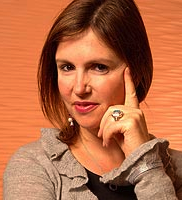Nicola Horlick – Georgina’s With Love
Nicola Horlick is every inch the stylish, assured businesswoman. In her smart offices just off London’s Park Lane, she is generous with her time and ready with her smiles.
Dubbed Superwoman from her City days, when among her many firsts was becoming the youngest woman ever to run a multi-billion dollar fund management firm, her latest enterprise has uncharacteristically taken 14 years to come to fruition.
Perhaps that is because it is as much a labour of love as a business venture, although business it certainly is and successful it is destined to become.
Georgina’s in Barnes, the first of what will grow into a chain of South West London restaurants, is a celebration of Nicola’s oldest daughter Georgie, who 14 years ago died, aged 12, in Great Ormond Street Hospital after a long battle against leukaemia.
It features many of Georgina’s favourites: delicious salads, Mediterranean food, a signature lobster dish, alongside the deli counter offerings like home-baked cakes and individually made sandwiches.
The menu was designed by Nicola and consultant chef Adam Byatt, chef-patron of London restaurant Trinity and author of such books as How to Eat In. The kitchen is in the capable hands of head chef Greig Hunter, who developed Trinity alongside acting as a home economist for Byatt’s books
It is hard to reconcile the awe-inspiring success of Nicola Horlick with her role as mother of six, a decade battling for Georgina’s survival, and an entire year spent living and sleeping in Great Ormond Street Hospital as Georgina had a successful bone marrow transplant, only to succumb to complications of her many years’ treatment.
How do you do that? Take six lots of maternity leave, the battle for your child’s life, grieve, go through “an unexpected divorce” and achieve beyond most women’s wildest dreams?
“I find it extraordinary that I got anywhere,” says Nicola. “I think securing early success was why I continued to succeed. Georgie was well until I was 28 years old, by which time I was on the fast track.”
She was, in fact, made a director by Warburg in the same week that her little girl was diagnosed with leukaemia. And that was a battle of an entirely different nature.
“I am a huge fan of the NHS,” says Nicola. You sense a but hanging in the air and there it is.
When Georgina was two Horlick had to break down doors, beat fists, to get anyone in the medical profession to believe that she often expressed concerns were other than those of “a neurotic mother”.
“Georgie looked dreadful. She was white, had bruising, bleeding gums, she was lethargic and yet it took me from April until mid-September of 1989 to get her diagnosed, by which time her haemoglobin was four when the normal level is 13 or 14. They kept saying she was okay and that it was just a virus and treated me like someone with Munchausen’s by proxy. I can’t believe, even now, that they treated me and her in that way. Perhaps if she had been diagnosed earlier she would have been alive today,” the voice trails off. “But you can’t think like that.”
And so when asked why doctors thought she was an irrational, over-anxious mum, she smiles. “Probably because there are plenty of neurotic women? Seriously though, I do worry that if I couldn’t get their attention what chance does someone who is not articulate have? I got more out of the NHS because I demanded it.”
A mother six times, for Horlick juxtaposition seems to be a norm. Directorship came with Georgina’s diagnosis and her death was followed, a month later, by her mother’s pregnancy with Benjie, now 12.
“I was grieving and pregnant. You can’t replace a 12-year-old daughter with a baby boy but having him in my arms was very comforting.”
Her children range from 23 to 12. Alice, the eldest, is a fashion designer; Serena, at 21, is well on the way to becoming a doctor; Rupert, aged 18, is finishing A-Levels and destined for Oxbridge; while 16-year-old Antonia is at school in America and Benjie is a boarder at a very British prep school.
Now married to writer and journalist Martin Baker, Nicola was supposed to be setting up SocGen’s new investment business when she went instead to where she was most needed, her daughter’s Great Ormond Street room. “I spent a whole year there and although I told them to find someone else, SocGen stood by me, said they would wait.”
Horlick is the kind of woman major companies would choose to wait for, which is not to say that she has always had an easy ride. She has had to fight her corner in the glare of the media spotlight more than once but she is a considerable brain and a considerable fighter.
There is something of the dramatis personae in her style, unsurprising as her original ambitions lay in acting and she auditioned for RADA before heading to a Law degree at Baliol College, Oxford. She decided neither to go into Law nor acting, preferring merchant banks to the Merchant of Venice. “I thought I might get bored delivering the same lines month after month,” she recalls.
Going for interviews she found “I was often the only woman being interviewed.” Then at SG Warburg & Co “It was 50% women interviewees. I thought it was a true meritocracy, and that was the reason they had done so well, so I accepted the job without any hesitation when it was offered to me. I certainly wouldn’t have been made a director at 28 in a traditional English merchant bank.”
Although “it was difficult to leave Warburgs because they had been so kind to me” she joined Morgan Grenfell Asset Management in 1991, becoming Managing Director of the UK investment business in 1992. When she was in charge, assets rose from £4 billion to £22.5 billion. She set up SG Asset Management and later Bramdean Asset Management LLP, handing over control of her Bramdean Alternatives fund three years ago. Then she changed direction without ever really changing horses.
Her major interests now lie in financing films through Derby Street Films, which has eight Hollywood and one British film in development, but for Horlick investments are investments, whether it’s banking, films or restaurants.
“Looking at things that don’t go down when the stock market goes down, films are right there,” she says. “Analysing M & S or a film project is still fund management. And when it comes to restaurants you need to set up in a recession.”
Really? In a recession? Nicola smiles, “Yes, counter-intuitive I know but true.”
And, of course, I believe her, after all, she is Superwoman and sufficiently confident of success with the first Georgina’s to make a £300,000 investment in a restaurant someone had already spent £350,000 on rebuilding before going bust.
So why will she succeed where others have failed? A question you imagine has followed her since her Baliol days.
“The food was dreadful when the previous incumbent was there,” she laughs. “And for a good community restaurant, you need three things to be right: food, location and service.”
She wants this to be a real community restaurant, the first of many. Perhaps a book club, a wine club, cookery evenings with the head chef. She and Martin live on the Thames just around the corner from the restaurant. All their kids (he has three) love Georgina’s.
But most of all you sense that the important thing, although financial success must be fundamental, is that Georgina would love Georgina’s. There’s little doubt that she would.
Patricia McLoughlin


